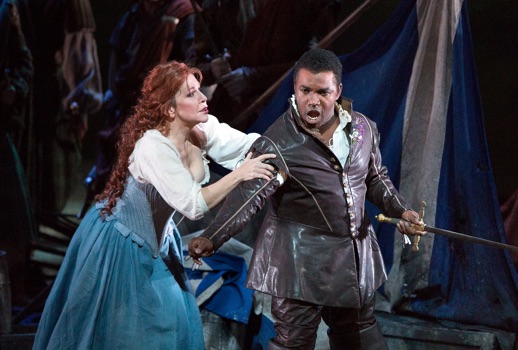

Reviving it Friday night just ten months after its premiere seemed foolhardy but anyone who hasn’t caught Rossini’s marvelous take on Walter Scott’s poem of romantic and political rivalries in the Scottish Highlands should grab the opportunity—maybe with his eyes closed. Who knows when there will be another chance to hear it?
The hero of the evening was conductor Michele Mariotti, who elicited taut, exciting performances from the Met orchestra and chorus and made a grand case for this splendid, problematic opera full of ravishing melodies and jaw-dropping vocal fireworks. More than once I averted my eyes from the mess on stage to observe Mariotti reveling in the ever-surprising orchestration.
I had hoped, for example, to enjoy Duglas’s stirring first-act aria but Oren Gradus’s labored, small-scaled rendition was even worse than last season’s so I just blocked him out and listened to the riot of wondrous color arising from the pit.
The returning Daniela Barcellona as Malcom remains a frustrating singer. Despite her long-term sterling Rossini credentials, the voice now has broken into three discrete registers; a muffled, barked chest; a thin middle and surprisingly bright and substantial top.
Her coloratura is “managed” with lots of half-voiced aspirates and lacks the sheer éclat one wants in this music. Rossini just doesn’t seem to suit her anymore as her calendar full of Amneris, Eboli, Santuzza, etc. suggests. Not much of an actress, she also wasn’t helped by her ungainly costume, a wretchedly ill-fitting kilt.
The third time was the charm for Osborn: the previous two instances I heard him (Guglielmo Tell at Carnegie and Donna’s Met premiere in February) he started out well but then pooped out in the cabaletta home-stretch. Friday found him instead in strong, consistent form, singing with admirable delicacy (smashing trills!) and fiery force.
His wide-ranging tenor can still take on a harsh, bawling edge at times but he used that effectively as the villainous Rodrigo whose political ambitions trump his amorous intentions toward Elena.
His strutting braggadocio contrasted strikingly with the more refined Uberto, the disguised king portrayed by the show’s sole newcomer Brownlee. If he lacked the steely debonair bravura of his predecessor Juan Diego Flórez, he brought greater vocal warmth and engagement with the drama.
Brownlee started out slowly, his lower voice sounding uncharacteristically unsteady, but was in fine form for a superb “O fiamma soave,” his extravagantly florid paean to the saintly Elena with whom he had spent a life-changing twenty minutes. He bravely overcame the production’s most risible tableau: just before his aria, one of the rebels jabbed a severed head onto a spike to display with several others on the peculiar post-nuclear landscape that is the Highlands.
Brownlee tossed off thrilling high Cs to match Osborn’s in that mesmerizing trio and also threw in a few Ds for good measure. Against such tenorial swaggering, Di Donato’s Elena might have been a bit self-effacing. Her burnished mezzo sounded somewhat reduced in volume from last season but her tendency to push high notes white and sharp was less pronounced.
Her impeccable Rossini style and mastery of always surprising, unerringly apt ornamentation remain matchless. If she worried the first half of “Tanti affetti” too much, its delirious conclusion dazzled triumphantly.
Revived by Gregory Keller, Paul Curran’s production (originally seen in Santa Fe) was a last-minute compromise after earlier productions starring Di Donato and Flórez seen around Europe were judged inadequate. While it presented the basic action clearly enough, it over-emphasized the civil war abounding in head-scratching, laugh-inducing moments like the chorus thrusting its spears into the air each time Osborn attacked a high note.
Malcom, then Duglas sneaking into the d’Angus household’s hidden booze stash provided unintended comic relief. Presumably money was tight for Kevin Knight’s barren set and dull costumes but surely he could have done up a new dress for Elena’s wedding to Rodrigo; instead Di Donato appeared in the same outfit (plus a veil) she’d worn the entire act.
I’ve loved this opera since I first heard the Montserrat Caballé–Franco Bonisolli–Pietro Bottazzo RAI broadcast as a teenager. Naively, I had high hopes when Opera Orchestra of New York produced it in 2003, but Eve Queler at her most lumbering failed to strike any sparks, while two scared-looking tenors botched the trio opposite the desperately bland Ruth Ann Swenson, while Stephanie Blythe definitively demonstrated she wasn’t the “next Marilyn Horne.”
Despite the Met’s dopey staging with its wrong-headed fairy-tale finale out of Rodgers and Hammerstein’s Cinderella, Rossini still worked his considerable magic thanks to Mariotti’s mastery and his devoted mezzo and tenors.

























Comments